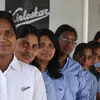Inside the Stovekraft factory in Bengaluru, an 80pc women workforce is driving change
Stovekraft, a leading player in the kitchen appliances sector, offers two flagship brands - Pigeon and Gilma. Around 80 percent of its workforce, both at the managerial and worker-level, are women. Director Neha Gandhi tells us why women form the pivotal force of the company.
1565260979143.png?fm=png&auto=format)
Neha Gandhi, Director - Stovekraft
It’s an hour-and-a-half drive to Harohalli, on the outskirts of Bengaluru, to get to the Stovekraft factory. Apart from being one of the largest privately held kitchen appliances company in India, Stovekraft has another significant achievement to boast of: around 80 percent of the employees at the factory are women.
Women may have proved their mettle across industries, but their presence in the Indian manufacturing sector is almost negligible. This is due to many factors, including long working hours, operating heavy machinery, physical labour, etc, traditionally considered the preserve of the male workforce.
This impressive number, 27-year-old Neha Gandhi, Director of Stovekraft, tells me, stems from the company’s consistent initiative to provide skill development to women and incorporate them as an important part of the manufacturing workforce.
Stovekraft offers two flagship brands - Pigeon and Gilma, which bring kitchen solutions through a wide range of kitchen appliances and cookware. These include pressure cookers, non-stick cookware, gas and induction cooktops, mixer grinders, chimneys, and hobs, among others.
Pigeon offers over 600 products while around 40 are retailed under Gilma. It is present in 23 states of India and 12 countries in the Middle East, Indian subcontinent, Africa, and North America. The company has its single largest manufacturing facility for kitchen appliances in Bengaluru and another manufacturing unit at Baddi, Himachal Pradesh.
It also holds the dealership for global brand Black & Decker, apart from venturing into the LED bulb area, which will be part of its Pigeon range.
Creating a conducive work environment

Women at the Stovekraft factory in Bengaluru
On a tour of the factory, the company representative explains that most of the women are in the 22-30 age group. Though the factory runs on three shifts, the women only work on the general shift (morning to evening), so that they can spend time at home with their families in the evening.
I stop to speak to Mangala at the gas stove unit. She is 28-years-old, married, and has two children. She comes from the Harohalli area itself and says that work at the factory has changed her life.
“I come from a poor family. My husband is an alcoholic who spends all his money drinking. Since he did not bring an income, I had to start working. I have two children, one in college, and the other in school. I have been working at Stovekraft for 3.5 years now, and I am happy to be able to run my family on this income,” she says.
Thirty-one-year-old Lakshmi is also in the same situation. A Class-VII dropout, she has been working for two years to supplement the family income. “Working here has helped my family financially. I like it here and will continue working here,” she says.
Neha explains that hiring women to work in the factory has been a continuous and conscious effort.
“Once the women are hired, they undergo training, according to their roles. These are fairly simple and repetitive skills and they can pick them up easily. The women working here are mostly married. They have children who go to the government school we have helped build in the vicinity.”
Building a community at the workplace
Apart from those mandated by law, the management also ensures the feeling of a community runs across the organisation.
“We celebrate a lot of events and festivals together. Nutritious meals are provided at the factory. Education is ensured through the government school. Family and accident insurance are provided to employees, and an overall sense of being part of a family is inculcated in each employee,” she adds.
Neha joined Stovekraft over three years ago to head the marketing division of the company. After completing her BBA from Christ University, she worked with multi-national Viacom in Mumbai where she honed her skills in advertising and marketing in multiple roles.
On a visit home to Bengaluru, her father, who founded the company more than a decade ago, suggested she join the business. Neha knew it was inevitable, having accompanied her father on international trade trips from the age of 16, and also having that business gene to start off.
“Born and raised in a Marwari family, I guess the business gene becomes a part of you. I started off in the marketing department and joined the board two years ago. If you ask me what difference I have brought to Stovekraft, I don’t think I have single-handedly brought about a significant change. One person cannot change the company’s DNA. You have to become a part of the DNA and bring in the changes at the right time,” she adds.
Prioritising employee happiness
However, talent, technology, and digital processes is what Neha is concentrating on to take the company forward.
Employee contentment is also high on her list of priorities, because Neha believes the generation gap is very fragile, and that definitely affects hiring trends.
“The 22-30 age group is very fragile. They are asking what value the company is adding to my life and what value I am adding to the role. If this does not work out, they move on. The older generation is more stable, and unless there is something drastic happening in their personal lives, they do not shift their jobs.”
Neha says it’s difficult for women to work in traditional field sales, because the rigidity at the ground level is so strong. “All the 300 people in our field sales team are men. Fortunately, now we have a woman regional sales manager for North India. Things have begun to change, but we still have a long way to go.”
According to Neha, women make for great employees because they “are empathetic, efficient, and good team players”.
“We want to be a global kitchen appliances company, with world-class products, that provides the best value for our customers. And, women are an important part of this driving force,” she says.
(Edited by Evelyn Ratnakumar)


1565260979143.png?mode=crop&crop=faces&ar=2%3A1&format=auto&w=1920&q=75)






